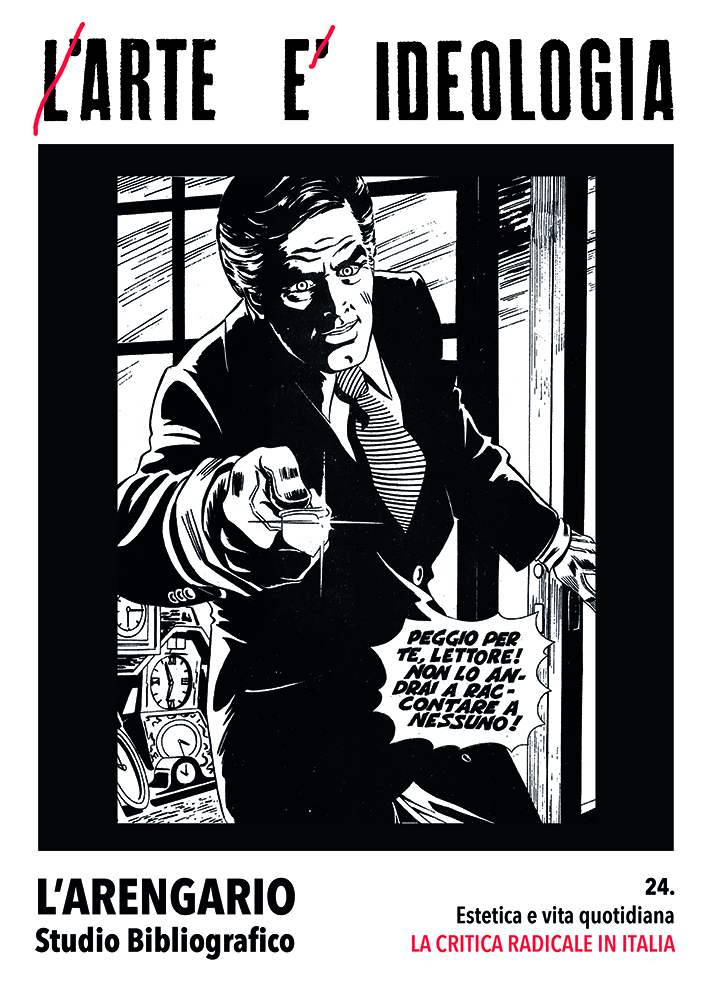L'ARENGARIO STUDIO BIBLIOGRAFICO - Dott. Paolo Tonini
Estetica e vita quotidiana. La critica radicale in Italia
Luogo: Gussago
Editore: L'Arengario Studio Bibliografico, "Arte e Ideologia 24"
Stampatore: prodotto in proprio
Anno: 2023 (25 settembre)
Legatura: brossura
Dimensioni: 29,7x21 cm.
Pagine: pp. X (2) - 118 (2) compresa la copertina
Descrizione: copertina illustrata con un fumetto detournato in bianco e nero. A cura e con un testo di Paolo Tonini («Critica radicale? / Radical criticism?»). Testo introduttivo di Gianni-Emilio Simonetti («Les feuilles mortes... (ovvero, la pensée sauvage)». Catalogo illustrato a colori, 118 schede ragionate. Edizione in formato digitale.
Bibliografia: N. D.
Prezzo: N. D.ORDINA / ORDER
"E’ bello sedere a tavola gustando cibi semplici e buoni, ma non da soli. E’ bello parlare, guardarsi in faccia sorridersi l’un l’altro, raccontare. E’ bello bere il vino rosso e quello bianco e lo champagne, sono belle la sbornia e le canzoni se ci sono gli amici i compagni gli ospiti i fratelli. La bellezza è sempre dove donne e uomini si abbracciano, dove i vecchi e i bambini parlano e sono ascoltati, dove ci sono baci e carezze per tutti, dove ci sono possibilità per chi ha sbagliato, per chi è stato bandito, per chi ha perduto la ragione, per chi non ha niente da dare in cambio. Un mondo così, una vita così ci sono stati in rari momenti della nostra preistoria, e non ce ne siamo più dimenticati. Era il 1525 nella città di Münster come nel 1870 a Parigi o nel 1919 a Fiume, o a Kronstadt nel 1921, a Bologna nel 1977... E oggi? Nel ventitreesimo anno del terzo millennio facce imbellettate e corpi orribilmente contraffatti ci parlano dai telefoni e dalle televisioni: abbiamo numi tutelari della nostra sicurezza e della nostra salute, i custodi del nostro immaginario ridotto in miseria, gli opinionisti che confortano la banalità dei nostri progetti, l’esiguità dei nostri desideri, l’obbedienza, la prudenza di chi non ha il coraggio di mettere in gioco la vita. Siamo all’ultima fase del disastro? Affinché il saggio del profitto non crolli sono necessarie le guerre e una libertà meglio vigilata. Intanto la meglio gioventù consuma il proprio tempo per garantirsi la sopravvivenza, con pazienza attendono in coda il loro turno. Sono loro che oggi pagano caro e tutto - chissà se il fuoco si è spento. E io sono solo un vecchio che piange seduto al caffè" (Paolo Tonini).
"It’s nice sitting at the table enjoying simple, good food, but not alone. It’s nice talking, looking at each other, smiling, telling stories. It’s nice drinking red wine and the white one and champagne, the drunkenness and the songs are nice if there are friends, companions, guests, brothers. Beauty is always where women and men embrace each other, where old people and children speak and are listened to, where there are kisses and caresses for everyone, where there are possibilities for those who have made mistakes, who have been banished, who have lost their reason, who have nothing to give back. There have been a world, a life like this in rare moments of our prehistory, and we have never forgotten it. It was 1525 in the city of Münster as 1870 in Paris or 1919 in Fiume, or Kronstadt in 1921, Bologna in 1977... And now? In the twenty-third year of the third millennium, painted faces and horrible counterfeit bodies speak to us from telephones and televisions: we have gods who protect our safety and our health, the guardians of our poor imagination, the commentators who comfort the banality of our projects, the smallness of our desires, the obedience, the prudence of those who do not have the courage to put his life on the line. Are we at the last stage of disaster? To prevent the rate of profit from collapsing, wars and a better supervised freedom are necessary. Meanwhile, the best youth consumes their time to ensure their survival, patiently waiting in line for their turn. They are those that pay dearly and everything now - who knows if the fire went out. And I’m just an old man that cries sitting in a cafe".
DOWNLOAD PDF FILE
"It’s nice sitting at the table enjoying simple, good food, but not alone. It’s nice talking, looking at each other, smiling, telling stories. It’s nice drinking red wine and the white one and champagne, the drunkenness and the songs are nice if there are friends, companions, guests, brothers. Beauty is always where women and men embrace each other, where old people and children speak and are listened to, where there are kisses and caresses for everyone, where there are possibilities for those who have made mistakes, who have been banished, who have lost their reason, who have nothing to give back. There have been a world, a life like this in rare moments of our prehistory, and we have never forgotten it. It was 1525 in the city of Münster as 1870 in Paris or 1919 in Fiume, or Kronstadt in 1921, Bologna in 1977... And now? In the twenty-third year of the third millennium, painted faces and horrible counterfeit bodies speak to us from telephones and televisions: we have gods who protect our safety and our health, the guardians of our poor imagination, the commentators who comfort the banality of our projects, the smallness of our desires, the obedience, the prudence of those who do not have the courage to put his life on the line. Are we at the last stage of disaster? To prevent the rate of profit from collapsing, wars and a better supervised freedom are necessary. Meanwhile, the best youth consumes their time to ensure their survival, patiently waiting in line for their turn. They are those that pay dearly and everything now - who knows if the fire went out. And I’m just an old man that cries sitting in a cafe".
DOWNLOAD PDF FILE

